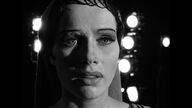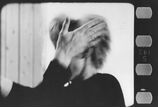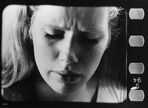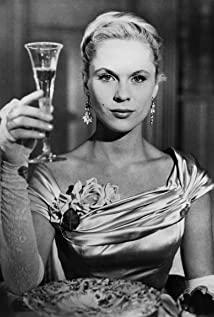"I want very much to tell, to talk about, the wholeness inside every human being. It's a strange thing that every human being has a sort of dignity or wholeness in him, and out of that develops relationships to other human beings, tensions, misunderstandings, tenderness, coming in contact, touching and being touched, the cutting off of a contact and what happens then.”
--------As quoted in I ngmar Bergman Directs ( 1972) by John Simon
In terms of social interaction, this quote depicts how social roles influence the understanding of a person about who they are. Goffman (1959, p. 43), presented that there are distinct differences between self-authenticity and self-socialization. Self-Socialization is developed through performing and internalizing different social roles. The high expectations of society lead to the need to hide self-authenticity and balance the socialized self from the authentic self.
In Persona , the difference in the role of a nurse from an actress is definitely wide due to the “specific characteristics” of their professions (Hubner, 2007). The performance of nurses and actresses' conduct influences self-socialization in different ways, which brings a different impact on the perspective of self-authenticity.
Actressesare the ones who portray a different set of roles into themselves by putting one's self in other people's lives and interpreting the various elements that need to be practiced to deliver accurately the moral of the story. The importance of empathy of an actor with different characters is crucial in performing and conducting their roles effectively. In Persona, Elizabeth has an awareness apprehension of her authentic self. By satisfying the expectations of the world, a part of herself feels fulfilled by feeding her ego's needs. Her work as an actress, allows her to see the various perspectives from the roles she has conducted and performed. She has been able to see things from the point of view of a nurse. Thus, she deeply understood Alma's thriving behavior, as well as the reasons for Alma's rage. Therefore, this doesn't affect the actress who stands tall, indifferent , does not care, and does not speak. A nurse's role cannot inhibit her authentic self.
It is crucial for an actress to have a clear understanding of her role as a mother on stage. When taking the role and performing as Electra, Elizabeth fears that might lose her equilibrium and distress herself where she cannot face the audience in expressing her self- authenticity that she cannot accept her incapability of caring for her son (Gado, 1986). As a result, she chose to remain silent.
Alma, as a nurse, is associated with service as a profession, one that requires her to perform actions related profession's function and, in most cases, hide her authentic self in order to meet the expectations of the audience. She builds herself in the essence of the evaluation and affirmation that comes from those she serves. Therefore, she is less aware of her self-authenticity. Her self-awareness is fragile because she needs constant feedback from the world in order to strengthen it. This profession had a great effect on her.
Consequently, her view of the world is limited, and she cannot empathize and understand the actress's role about why she doesn't love her child. Rage is rising within her and she had a hard time understanding. In addition, she cannot receive a response from Elizabeth, thus, violates her ego. Again, the nurse admires the actress for having a strong nature. In the end, as she cares for Elizabeth, Alma is drawn into Elizabeth's powerful characteristics and eventually becomes Elizabeth's 'double'.
The picture above depicts that this scene emphasizes that Elizabeth uses Alma as her 'spokesperson'. Elisabeth and Alma represent a combination of self-authenticity and self-socialization, creating a wholesome character the presents both social and individual attributes.
Scenes from a marriage
According to Karkani (2019), Marianne, the female protagonist of the S cenes from a marriage, resembles the characters Elizabeth and Alma from P ersona, both exhibiting contradictory emotions, as well as concealing parts of themselves, as Elizabeth hiding behind a 'persona mask '.
The interview of the opening scene displays Marianne's belonging to the family and Johan's dominance in the relationship. Marianne thinks and answers from the perspective of Johan and the whole family but talks nothing about herself. Her ability to perceive herself and her life slowly disappears under the expectation of the so-called perfect couples.
The ignorance of emotions and senses is what the film is trying to portray, the lack of awareness of one's self to another and for those people around them as Bergman (2007) stated. The film portrays not only marriage but also a woman's journey to pursue self-awareness.
Marianne's marriage and relationship with Johan seem to go along with the requirements of marriage, allowing herself to meet and follow the demands of being a wife and a mother (Kalin, 2003). Married women are often unaware of their true selves. Marianne started realizing and understanding her true self after being cheated on.
As the story progressed, we learn that she suppressed her authentic self, but kept trying to cope her needs by seeking love and security in intimate relationships. She has suppressed her sexuality, and her difficult in upbringing hindered understanding her inner desires. She remained her composure while working as a lawyer, Marianne barely displays any signs of emotional breakdowns not until she signed the divorce papers, where she cried her heart out and shouted, "you, your parents, and society are breaking me!".
In the fourth chapter, Johan becomes tired with his relationship with Paula and finds refuge in Marianne's comfort. In contrast, Marianne contemplates seeking psychological redemption, and knocking up her self-subjectivity.
In the scene of diary reading sequences, subtlety is revealed, when Johan is still looking on material comfort while Marianne started in redeeming herself from her current situation in which, her marriage with Johan. Marianne realizes the value of the spiritual connection she achieved while contemplating the situation that both she and Johan have lost their selves in daily activity trying to sustain the marriage. Marianne is determined to rebuild their lives and marriage together, but unfortunately, Johan surrenders.
Chapter five shows a climax about the divorce scene.
Marianne is confident and in high spirit while Johan is discouraged and disheartened. Marianne regains a better life phasing herself resentment towards Johan for their original family, as she has written in her diary in the previous scene. Marianne realizes that she has forced herself to be 'perfect' in everyone's eyes, but the perfection she always attained has been done at the expense of herself.
Alma and Marianne had a hard time discovering and understanding their inner desires and were blinded by the expectations that society has not only to the moral and individual responsibilities but also on how they should act in the society. My recommendation is to take off the mask to face your true self and always be inquisitive to question the so-called real self.
View more about Persona reviews










